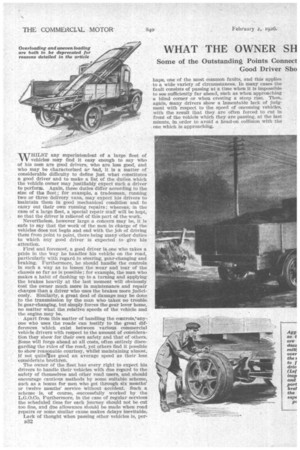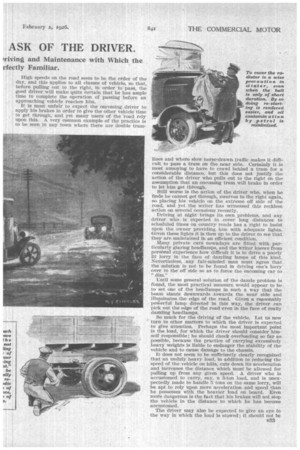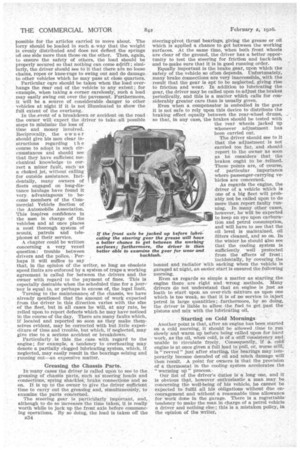WHAT THE OWNER SH ASK OF THE DRIVER.
Page 16

Page 17

Page 18

If you've noticed an error in this article please click here to report it so we can fix it.
VVTHILST any superintendent of a large fleet of vehicles may find it easy enough to say who of his men are good drivers, who are less good, and who may be characterized ar bad, it is a matter of considerable difficulty to define just what constitutes a good driver and to make a list of the duties which the vehicle owner may justifiably expect such a driver to perform. Again, these duties differ according to the size of the fleet; for example, a tradesman, running two or three delivery vans, may expect his drivers to Maintain them in good mechanical condition and to carry out their own running repairs; whereas, in the case of a large fleet, a special repair staff will be kept, so that the driver is relieved of this part of the work.
Nevertheless, however large a concern may be, it is safe to say that the work of the men in charge of the vehicles does not begin and end with the job of driving them from point to point, there being many other-duties to which any good driver is expected to give his attention.
First and foremost, a good driver 3s one who takes a pride in the ivay he handles his vehicle on the road, particularly with regard to steering, gear-changing and braking. Furthermore, he should handle the controls in such a way as to lessen the wear and tear of the chassis so far as is possible ; for example, the man who makes a habit of dashing up to a turning and applying the brakes heavily at the last moment will obviously Cost the owner much more in maintenance and repair charges than a driver who uses the brakes more judiciously. Similarly, a great deal of damage may be done 0 the transmission by the man who takes no trouble In gear-changing, but simply forces the gear lever home, no matter what the relative speeds of the vehicle and the engine may be.
Apart from this matter of handling the controls,ianyone who uses the roads can testify to the great differences which exist between various commercial Vehicle drivers with respect to the amount of consideration they show for their own safety and that of others. Some will forge ahead at all costs, often entirely disregarding the rules of the road, yet others find it possible to show reasonable courtesy, whilst maintaining almost, If not quiteas good an average speed as their. .less considerate brethren.
The owner of the feet has every right to expect his drivers to handle their vehicles with due regard to the safety of themselves and other road users, and should encourage cautious methods by some suitable scheme, such as a bonus for men who get through six months' or twelve months' service without accident. Such a scheme is, of course, 'successfully worked by the L.G.O.Co. Furthermore,in the case of regular services the scheduled time for each journey should not be cut too fine, and due allowance should he made when road repairs or some similar cause makes delays inevitable.
Lack of thought when passing other vehicles is, per1132 haps, one of the most common faults, and this applies to a wide variety of circumstances. In many cases the fault consists of passing at a time when it is impossible to see sufficiently far ahead, such as when approaching a blind corner or when cresting a steep rise. Then,. again, many drivers show a lamentable lack of judgment with 'respect to the speed of oncoming vehicles, with the result that they are often forced to cut in front of the vehicle which they are passing, at the last minute, in. order to avoid a head-on collision with the . one which is approaching. High speeds on the road seem to be the order of the day, and this applies to all classes of vehicle, so that, before pulling out to the right, in order to pass, the good driver will make quite certain that he has ample time to complete the operation of passing before an approaching vehicle reaches him.
It is most unfair to expect the oncoming driver to apply his brakes in order to give the other vehicle time to get through, and yet many users of the road rely upon this. A very common example of the practice is to be seen, in any town where there are double tram lines and where slow horse-drawn traffic makes it difficult to pass a tram on the near side. Certainly it is most annoying to have to crawl behind a tram for a considerable distance, but this does not justify the action of the driver who pulls out to the right on the assumption that an oncoming tram will brake in order to let him get through.
Still worse is the action of the driver who, when he finds he cannot get through, swerves to the right again, so placing his vehicle on the extreme off side of the road, and yet the writer has witnessed this reckless action on several occasions recently.
Driving at night brings its own problems, and any driver who is ekpected to cover long distances to scheduled times on countryroads has a right to insist upon the owner providing him with adequate lights. Given these lights it is then up to the driver to see that they are maintained in an efficient condition.
Many private ears nowadays are fitted with particularly glaring headlamps, and the writer knows from personal experience how difficult it is to drive a poorly lit lorry in the face of dazzling lamps of this kind. Nevertheless, any fair-minded man must agree that the solution is not to be found in driving one's lorry over to the off side so as to force the oncoming car to "dim."
Until some general solution of the dazzle problem is found, the most practical measure would appear to be to set one of the headlamps in such a way that the beam slants downwards towards the near side and illuminates the edge of the road. Given a reasonably powerful lamp directed in this way, the driver can pick out the edge of the road even in the face of realty dazzling headlamps.
So much for the driving of the vehicle. Let us now turn to other matters to which the driver is expected to give attention. Perhaps the most important point is the load, for which the driver should consider himself responsible; he should check overloading so far as possible, because the practice of carrying excessively heavy weights is liable to endanger the stability of the vehicle and to cause damage to the chassis.
It does not seem to be sufficiently clearly recognized that an unduly heavy load, in addition to reducing the speed of the vehicle on hills, cuts down its acceleration and increases the distance which must be allowed for pulling up from any given speed. A driver who is accustomed to carry, say, a 3-ton load, and is unexpectedly made to handle 5 tons on the same lorry, will be apt to rely upon more acceleration and speed than he possesses with the heavier load on board. Even more dangerous is the fact that his brakes will not stop the vehicle in the distance to which he has become accustomed.
The driver may also be expected to give an eye to the way in which the load is stowed ; it should not be B33
possible for the articles carried to move about. The lorry should be loaded in such a, way that the weight is evenly distributed and does not deflect the springs od one side more than those on the other. Then, again, to ensure the safety of others, the load should be properly secured so that nothing can come adrift ; similarly, the driver should see to it that there are no loose chains, ropes or knee-rugs to swing out and do damage to other vehicles which he may pass at close quarters.
Particular care should be taken when the load overhangs the rear end of the vehicle to any extent; for example, when taking a corner carelessly, such a load may easily swing out over the pavement. Furthermore, it will be a source of considerable danger to other vehicles at night if it is not illuminated to show the full extent of the overhang.
In the event of a breakdown or the owner will expect the driver steps to minimize the loss Of time and money involved. Reciprocally, the owner should give his men clear instructions regarding the course to adopt in such circumstances and should see that they have sufficient mechanical knowledge to correct a minor fault, such as a choked jet, without calling for outside assistance. Incidentally, many owners of fleets engaged on long-distance haulage have found it very advantageous to become members of the Commercial Vehicle Section of the Automobile Association. This inspires confidence in the men in charge of the vehicles and at once places a most thorough system a scouts, patrols and telephones at their service.
A chapter could be written concerning a very vexed question: trouble between drivers and the police. Perhaps it will suffice to say that, in the opinion of the writer, so long as obsolete speed limits are enforced by a system of traps a working agreement is called for between the drivers and the Owner with regard to the payment of fines. This is especially desirable when the scheduled time for a jour'ney is equal to, or perhaps in excess of, the legal limit.
Turning to the maintenance of the chassis, we have already mentioned that the amount of work expected from the driver in this direction varies with, the size of the fleet, but in all cases he will, at any rate, be relied upon to report defects which he may have noticed in the course of the day. There are many faults which, if located and reported so soon as they make themselves evident, may be corrected with but little expenditure of time and trouble, but which, if neglected, may give rise to a serious accident or breakdown.
Particularly is this the case with regard to the engine; for example, a tendency to overheating may denote a partially clogged lubricating system, which, if, neglected, may easily result in the bearings seizing and running out—an expensive matter.
accident on the road to take all possible
Greasing the Chassis Parts.
In many eases the driver is called upon to see to the greasing of chassis parts, such as steering heads and connections, spring shackle,' brake connections and so on. It is up to the owner to give the driver sufficient time to carry out the, greasing and, simultanecnisly, to examine the parts concerned. The steering gear is particularly impOrtant, and, although to do so increases the time taken, it is really worth while to jack up the front axle before commencing operations. By so doing, the load is taken off the
334
steering-pivot thrust bearings, giving the grease or oil which is applied a chance to get between the working surfaces. At the same time, when both front wheels are clear of the ground, the driver has a better opportunity to test the steering for friction and back-lash and to make sure that it is in good running order.
Equally important is the brake gear, upon which the safety of the vehicle so often depends. Unfortunately, many brake connections are very inaccessible, with the result that the gear is apt to be neglected, giving rise to friction and wear. In addition to lubricating the gear, the driver may be called upon to adjust the brakes periodically, and this is a matter which calls for considerably greater care than is usually given.
Even when a compensator is embodied in the gear it is not safe to rely upon this device to distribute the braking effect equally between the rear-wheel drums, so that, in any case, the brakes should be tested with the rear wheels jacked up whenever adjustment has been carried out.
The driver should see to it that the adjustment is not carried too far, and should report to the owner as soon as he considers that the• brakes ought to be relined. These points are, of course, of particular importance where passenger-carrying vehicles are concerned.
As regards the engine, the driver of a vehicle which is one of a big fleet will probably not be called upon to do more than report faulty running. In many other eases, however, he will be expected to keep an eye upon carburation and petrol consumption, and will have to see that the oil level is maintained, oil filters cleaned, and so on. In the winter he should also see that the cooling system is sufficiently well protected from the effects of frost; incidentally, by covering the bonnet and radiator with sacking when the vehicle is garaged at night, an easier start is ensured the following morning.
Even as regards so simple a matter as starting the engine there are right and wrong methods. Many drivers do not understand that an engine is just as loath to start upon an over-rich mixture as upon one which is too weak, so that it is of no service to inject petrol in large quantities; furthermore, by so doing, the driver is liable to allow, the fuel to get past the pistons and mix with the lubricating oil.
Starting on Cold Mornings - Another point is that, after an engine has been started on a cold morning, it should be allowed time to run slowly and warm up before being called upon for hard work, as the oil, when cold, is of a stiff -consistency and unable to circulate freely. Consequently, if acold engine is at once given a full load to pull, or, worse still, is " revved " just after starting, the bearings may temporarily become denuded of oil and much damage will then result. A point for owners is that the provision of a thermostat in the cooling system accelerates the "warming up" process.
Our list of the driver's duties is a long one, and it is obvious that, however enthusiastic a man may be concerning the well-being of his vehicle, he cannot be expected to fulfil all his obligations without due encouragement and without a reasonable time allowance for work done in the garage. There is a regrettable tendency to make the man in charge of a petrol vehicle a driver and nothing else; this is a mistaken policy, in the opinion of the writer.






























